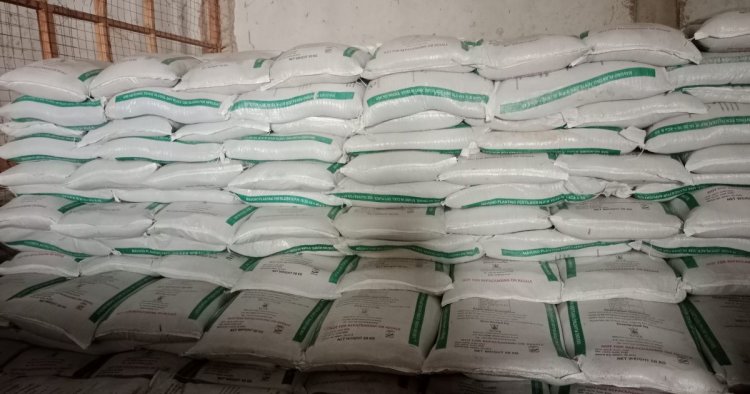FACT CHECK: Rachel Ruto's Claim That Uganda Does Not Use Fertilisers [VIDEO]
Rachel put a stark contrast to Kenya's reliance on fertilisers for farming, suggesting that Uganda's agricultural success was attributed to divine intervention other than agricultural practices.
![FACT CHECK: Rachel Ruto's Claim That Uganda Does Not Use Fertilisers [VIDEO]](https://viraltea.co.ke/uploads/images/202404/image_870x_661ff4a90536a.jpg)
On Tuesday, April 17, First Lady Rachel Ruto set social media on fire after she claimed that Uganda residents do not plant their crops with fertiliser and instead rely on East Africa Revival prayers to bolster their country's fertility.
She was speaking on Monday, April 16 during a Thanksgiving service at the Kenyatta International Convention Centre (KICC) when she claimed that Ugandans have been beneficiaries of the East African revival that swept the country in the 1930s, where 'God blessed them with fertile land and rains.'
Rachel put a stark contrast to Kenya's reliance on fertilisers for farming, suggesting that Uganda's agricultural success was attributed to divine intervention other than agricultural practices.
"In Kenya, we have to plant with fertilisers. but Ugandans don't plant with fertilisers. In 2022, when I visited Uganda, I realised the country was green while in Kenya it was dry and many people suffering due to drought. Apostle Subi told me he was so shocked when he came to Kenya and found people planting with fertilisers.
Here is the video:
"I got an answer the other day. The reason why Uganda is very fertile and it has been raining is because of the East Africa Revival that swept Uganda and some parts of East Africa," Rachel explained.
Her comments however sparked criticism and discussions across the country, a matter that prompted Viral Tea to do its independent fact-checking using Google's generative artificial intelligence chatbot, Gemini AI, for the very first time.
The Truth (From AI's View)
When we sought clarification on Rachel's comments that Uganda doesn't use fertiliser and their crops grow through prayers, Gemini AI denounced this, stating that the country has one of the lowest fertiliser use rates in the world.
An abstract from a project paper by the International Food Policy Research Institute titled 'Use of inorganic fertilizers in Uganda' further confirms this, even though Uganda has one of the highest soil nutrient depletion rates in the world.
"It has one of the lowest rates of annual inorganic fertilizer application – only 1.8 kg per hectare. The World Bank calculated that the value of replacing these depleted soil nutrients could be 20 per cent of the average rural Ugandan household income. Promoting fertilizer use is therefore crucial to sustainably increase agricultural productivity in Uganda," stated the abstract in part.
Gemini AI further underlined for us three reasons behind the uncommon use of fertilisers:
- Cost: Fertilizer can be expensive for many Ugandan farmers.
- Availability: Fertilizer access can be limited in some areas.
- Knowledge: Farmers may not be aware of the benefits of fertilizer or how to use it effectively.
"This low fertilizer use contributes to low soil fertility, which can hurt crop yields. There are efforts underway to increase fertilizer use in Uganda, but it's still a challenge," Gemini AI told us.
According to EPRC, in 2013, Uganda was revealed to use less than two kilograms of plant nutrients, per hectare, per year, and the replenishment of the nutrients lost through crop harvests and other factors such as soil erosion has not been to the required level. Consequently, soil fertility went very low and continued to decline, leading to low agricultural production and productivity.
To reverse the trend of low and declining soil fertility, the Ugandan government was to embark on deliberate efforts and strategic actions to support the availability and use of fertilizers, both organic and inorganic, by all categories of farmers.
The target was to increase the rate of use of fertilizers to at least 50 kgs of nutrients, per hectare per year, within five years and eventually reach the recommended average of 200 kg of nutrients per hectare per year.

Bags of fertiliser stored at a National Cereals and Produce Board warehouse. /KENYA NEWS AGENCY
"This translates into 250,000 Metric Tons of nutrients for the 5 million hectares of cultivated land within the next five years and eventually 1,000,000 Metric Tons, to achieve the 200 kg of nutrients per hectare," stated EPRC in part in its press release.
Our Verdict
It is safe to conclude that Rachel's direct sentiment of Ugandans not using fertilisers is false. This underscores the importance of evidence-based policymaking and the need for public figures to verify information before making public statements.
A section of Kenyans emphasised the role of scientific research and data-driven approaches in addressing agricultural challenges rather than relying solely on prayer. Critics however cited the achievements of past First Ladies in championing impactful initiatives, contrasting them with Rachel's focus on prayer.
Rachel's comments also prompt reflection on the role of leadership in addressing societal issues. But whereas prayer and gratitude are important aspects of faith, critics argue that leaders should prioritise practical solutions backed by evidence and expertise to tackle complex challenges such as food security and agricultural sustainability.






